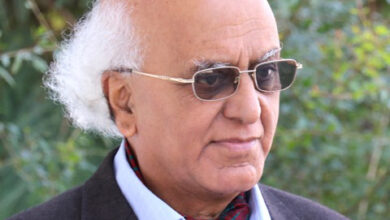Why do some countries benefit from the turbulent political journey of Pakistan?
In recent years, China has established itself as Pakistan’s closest ally and supporter, pouring enormous sums of money into infrastructure projects funded by the Belt and Road Initiative (BRI), particularly the China-Pakistan Economic Corridor (CPEC).

Dhaka: Pakistan’s current political and economic crisis is complicated and multifaceted, with significant geopolitical repercussions. It has been made clear how vulnerable the civilian administration is and how strong the military institution is due to the recent arrest of Prime Minister Imran Khan on corruption accusations. As each of them has various interests and agendas in the region, geopolitical players, including the USA, KSA, China, India, and Russia, play a significant part in the political processes in Pakistan. This article focuses on the geopolitical factors causing internal strife without any apparent solution for the politicians of Pakistan. The prevalence of political instability in Pakistan poses significant challenges for the populace, impeding routine economic and social undertakings and engendering the risk of loss of life.
Relation with the United States
Long-standing strategic ties between the US and Pakistan are primarily focused on joint efforts to combat terrorism and maintain peace, ironically leading to more terrorism and a deep sense of insecurity in the region, including Pakistan. However, differences in promised outcomes, sometimes perceptions and national interests on problems like Afghanistan, India, China, and the fantasy of Western democracy have soured US-Pakistan relations in recent years. The US, which is nearly eight thousand kilometres far from Pakistan, where every citizen can exercise constitutional rights to have killing weapons, and a country that has become a temple to the corrupt, has criticised Khan’s administration for its lack of reforms, charges of corruption, violations of human rights, and strong relations to its neighbouring China. The opposition parties’ efforts to remove Khan through democratic channels have also received support from the US. The US expects a new Pakistani administration to be more receptive to its strategies and interests, particularly in limiting Chinese geoeconomic influence, the peace talks in Afghanistan, and regional security issues with India.

K.M. Chaudary/AP
Saudi Arabia is still a significant ally
Another significant ally of Pakistan is the Kingdom of Saudi Arabia (KSA), which provides it with financial backing, oil shipments, and ideological and religious affinities. KSA sees Pakistan as a crucial ally in limiting Iran’s influence in the area and advancing Sunni Islam. KSA has also sponsored his administration to capitalise on Imran Khan’s support among the populace and his military connections. However, Pakistan’s expanding ties with China and Turkey and its reluctance to join the Saudi-led coalition against Yemen have presented difficulties for KSA. Nonetheless, China’s recent Iran-Saudi normalisation agreement has opened the door for Saudi Arabia and Pakistan to re-evaluate their relationship.
A friend of China?
In recent years, China has established itself as Pakistan’s closest ally and supporter, pouring enormous sums of money into infrastructure projects funded by the Belt and Road Initiative (BRI), particularly the China-Pakistan Economic Corridor (CPEC). In addition to serving as a check on India’s rise and the US’s influence in the area, China sees Pakistan as a crucial link in its energy and connectivity security aspirations. China has maintained Pakistan’s territorial integrity and sovereignty in public forums like the UN Security Council but has kept itself distant in domestic political crises. China has backed Khan’s government because of its dedication to CPEC and conformity with China’s regional strategy. Additionally, China has been concerned about any outside involvement or unrest in Pakistan that would endanger its investments and interests. China expects that Pakistan’s political issues will be managed quickly and amicably without harming its BRI projects or Pakistan’s strategic alliance with China. Nevertheless, opposing parties may attempt to incite political turmoil within Pakistan to instigate disruptions that may prompt China to reconsider its geoeconomic approach in the region.
The Arch rivalry
Since their separation in 1947, India and Pakistan have fought four wars over the Kashmir conflict and other matters. While Pakistan accuses India of oppressing people in Kashmir and backing Baloch insurgents there, India accuses Pakistan of funding terrorism and separatism in Kashmir and other parts of India. Additionally, India has opposed Pakistan’s nuclear programme and its support for China. It is learned from several analyses that India had further backed the opposition parties’ initiatives to remove Khan within a democratic context; that move was aligned with the US strategy in Pakistan. India thinks aligning with the US will help Pakistan’s new administration be more flexible on bilateral issues, particularly those involving Kashmir and terrorism. Persistent political instability in Pakistan has been a sensitive aspiration for India regarding its domestic and regional politics.
![Supporters of former prime minister Imran Khan and riot police scuffle outside Khan's house to prevent officers from arresting him in Lahore [Arif Ali/ AFP]](https://www.southasiancorrespondent.com/wp-content/uploads/2023/05/pak-3.webp)
Since the Soviet invasion of Afghanistan in 1979, when Pakistan supported mujahideen rebels opposing the Soviet-backed state, there has been tension between Russia and Pakistan. Since then, Pakistan’s importance in regional security and its relations with the United States and China have raised concerns in Russia. But in recent years, Russia has strengthened ties with Pakistan to recognise the country’s significance in resolving the Afghan war, opening business and trade opportunities through Chinese geoeconomics, and countering US hegemony. In addition, Russia has shown interest in working with Pakistan on regional stability and counterterrorism while selling it oil and weaponry.
A trap of instability from which Pakistan needs to scape
These are a few vital international players whose interests are entwined with the resolution of Pakistan’s political crisis. Other regional and international players, like Iran, Turkey, and the European Union, are also involved in the situation to differing degrees and have interests in it. More than ever, international players are engaged in the political instability in Pakistan and working to shape its outcome to suit their goals and tastes. Depending on their ideological stance and strategic alignment, the international players support, withdraw, and tweak support for various domestic political forces in Pakistan, including the military. Depending on their proportional profits or losses from the status quo or change, some players benefit from Pakistan’s political crisis more than others.
Is there any end to political instability in Pakistan?
Pakistan’s political crisis may be resolved through communication and compromise between the different internal and external players. The solution must take into account Pakistan’s inclusive traditions, constitutional order, and sovereignty, as well as its territorial integrity. The crises’ underlying roots, such as irresponsible politics, foreign interference in politics, corruption, poverty, inequality, extremism, violence, regional inequalities, ethnic tensions, institutional flaws, outside involvement, etc., must be addressed in the solution. The Pakistani people’s desires and complaints should also be considered, as they deserve peace, prosperity, justice, and dignity.
Rajeev Ahmed , Geopolitcal Analyst, Strategic Thinker and the Editor at geopolits.com





